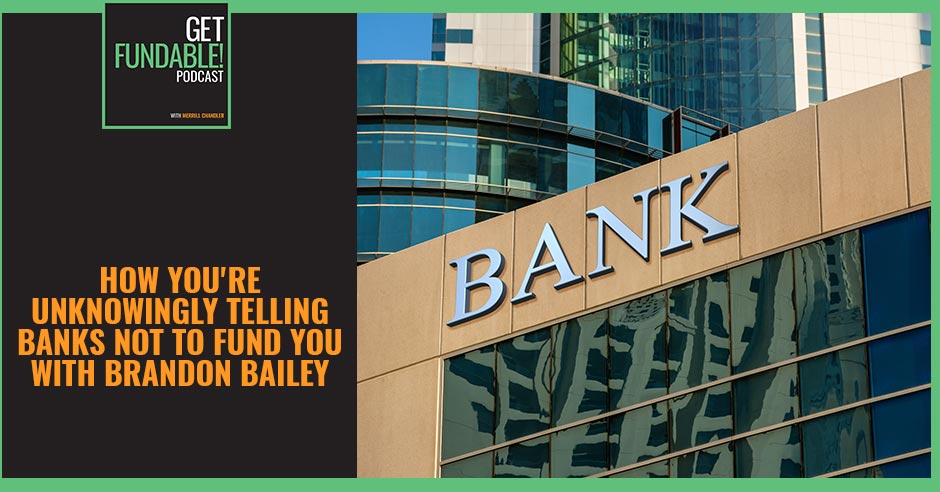
If you could read the minds of bankers, would you? Fortunately, you don’t need to summon psychic abilities for this one. Merrill Chandler sits down with a former Tier 4 banker turned business owner, Brandon Bailey, to share with us what goes on inside of the bank between bankers and underwriters. Brandon reveals some inside information about how you’re unknowingly telling banks NOT to fund you. Tune in and earn great tips and tricks on fundability and understand why it’s not all about credit scores.
—
Watch the episode here
Listen to the podcast here
How You’re Unknowingly Telling Banks NOT To Fund You With Brandon Bailey
In this episode, Brandon Bailey, a former tier four banker, is joining me to go over that everything you’ve been learning is what’s happening inside of the bank between bankers and underwriters at the same branch. A fascinating conversation is awaiting you. I will see you on the inside.
—
I have a treat for us. Everything about fundability for us is about qualifying for bank, credit lines, business loans, personal loans, and personal and business bank credit cards. It is the whole slew, but it’s all about banks. My guest here with me is Brandon. Brandon is a former banker. In this conversation, he is going to share with us some of the things that we’ve discussed. We met a couple of years ago. We want to make sure that you guys know from the former horse’s mouth exactly what was happening inside of the bank while he was working there and some of the stories because it’s fascinating. That’s why we have become friends.
—
Brandon, how are you doing?
I’m doing outstanding. Thanks for having me. I appreciate it.
Give us an idea of your history at this tier one bank. There are only four of them. We’re not going to diss the bank itself, but it’s common across all tier 1 and tier 2 banks.
I got into banking as a joke. I thought it would be funny because I had a couple of people that told me, “You should get into banking because you could teach people about money and credit.” I said, “I don’t like corporate jobs.” I ended up getting into it as a joke, and I’m glad I did because I learned so much that will save me so many financial and credit headaches for eternity. I’m blessed to know the things I’ve learned from you and then have applied in banking are dead on. There’s not even a smidge of, “That didn’t work.”
We met at one of the presentations I did in a real estate group. He was like, “Hold it. Here is this non-banker talking this stuff.” You said that it created a context for some of the experiences you were having on the inside. Formerly, there were 28 scores. There are 31 credit scores now. You have a couple of stories about what all those scores mean as a banker. How was the knowledge of those scores either given or withheld from the borrowers to your customers?
Here is a tip. We would do a loan or something to that effect. On the other side of the screen, it would say the FICO score, but it would say, “Do not disclose to customer.” I can only infer the reason why is because we are so in a world of uneducatedness about how those scores work. I’m saying it here that most bankers don’t even know how the score works.
Always believe that underwriting is a judgment call. It's a judgment call on the person's behaviors on whether they're going to pay that back or not. Share on XLet’s lead into that. Take us through what it was to be a frontline retail loan officer and your relationship with underwriting or the underwriters.
Usually, in the bank that I worked at, underwriters don’t talk to bankers. I know why they don’t talk to bankers. It is because bankers don’t know anything that they need to know. The underwriter wants to approve the application, but sometimes, underwriters are too meticulous about things. Therefore, you don’t get approval. In their eyes, you have to show them that this is approval.
This is part of the reason why things are going to automatic underwriting because in manual underwriting, as a loan officer or a banker, you’re the attorney. You’re going to the judge, which is the underwriter doing manual underwriting. You’re like, “I’m open to it. You tell me why.” Your banker or loan officer has to do the heavy lifting to say, “What about this? Does this matter?” It’s all manual. We were talking about it where you had to go to the math with an underwriter on behalf of a client, and there was no precision whatsoever.
There was this couple. Their credit was not something that you would want to see at all. It was not very favorable in the data. They even printed out their credit reports and showed me. You look at it and you’re like, “This is not going to be applied.” Even for a secured product, it was challenging to get them an approval. Therefore, I had to fight based on these underwriting circumstances.
I was like, “I know it’s a decline, but how can we get it to an approval?” The thing that we got it to an approval was address verification. When Merrill talks about your PBIB, it is no joke because we have to understand that the underwriters don’t know who we are. They only know based on the piece of paper that we presented. Therefore, if our piece of paper is incorrect, how do we expect them to say they know us?

Bank Fund: We are so in a world of uneducated newness about how those credit scores work. Most bankers don’t even know how the score works.
Do you realize that 30% of Americans don’t even have their current legitimate residence address on their driver’s license? Thirty percent of America have an old address on their driver’s license. You got them approved for a secured credit card based on legitimizing their actual PBIB. Let’s set aside the fact that we know what the heck we’re talking about when it comes to everything in fundability, but think about it. The banker is the one going to bat for you trying to get approval. Even with automatic underwriting because they may say manual review for something. Tell us what a manual review is.
I had a client who came in. He made a good income. It was what I felt was a good income because it was $175,000 a year. He had two credit cards with another great bank that we won’t talk about at $50,000 worth of debt. This is also high utilization. I don’t know if I should go into the joke of debt consolidation at a bank because it’s a joke. In debt consolidation, almost everyone comes in and says, “I want a lower interest rate because I want to consolidate everything to one low, easy payment.”
I got schooled by an underwriter. She said, “I want you to look at this situation. He has $50,000 worth of credit card debt. He wants a loan to pay off the credit card debt for a lower interest rate.” I said, “Okay.” She said, “Here’s what’s up. These credit cards are with different financial institutions. I know we’re sending it directly to that lender, and it’s going to pay off the card. However, what’s to say in his behavior that he doesn’t max out those credit cards again? We have no control over making him close them down. We can’t make the customer close a card down.”
You said the perfect word. Your borrower behaviors are the indicators. All they have to do is look at the borrower behaviors from that other institution. If he has a borrower behavior of having a mental capacity to hold $50,000 in debt, after you pay it off, your mental capacity or your behaviors are based on a belief of, “I can pay for it. I make $200,000 a year.” The story is, “I can afford it,” so they carry it. As a result, the borrower behaviors rat you out. Also, it’s at a different institution. It’s not like, “We can lower the limits.” This institution could lower the limits the second he started going back to those old habits or those borrower behaviors. This is no joke. It’s weird that we know what we’re talking about from a banker’s perspective.
After a few years in banking, I got bored because I had figured everything out. It was sad because so many customers were not educated coming into the financial institution, so they’re coming in with an egg on their heads. They’re like, “Wow.” You understand that the bank wants to lend you money because that’s how they make money, but you have told them in your behavior of your piece of paper, “Don’t give me money. I don’t want any money.” People said, “I want money.” I said, “You don’t want money because you’re not willing to understand how it works.”
Banks want to lend money to people that don't need it. Share on XYou don’t want money because you’re telling the bank, “No.”
Even underwriters, as much as you think they know about a lot of these things, half the time, they don’t. It’s the same time as a banker. You’re trained to learn the system of banking and underwriting. How it truly works and makes it go through is something that underwriters and bankers are not taught. It’s up to the banker or the underwriter to educate themselves and become better at, “How can I make this work for both sides? Can I protect the bank but also empower the borrower?” That’s the thing that we don’t talk about because people just walk into the bank like they’re going to the dentist’s office.
It’s a painful experience. I had a memory. I’ve talked to a lot of lenders, but it was after my time at FICO. I met you before I knew FICO and therefore, knew the other underwriting teams. Back in 2014 or 2015, I was brand new to harvesting all this data and doing the data points. We got so excited. You said, “I want to have my district manager have you come down and train the bankers on fundability.” Do you remember that conversation?
Yeah.
We were going to come down. He even got me on the phone with the district manager. We started running down some of the highlights of what we can do to train the bankers to know. His response was, “This is amazing information. It will take our team off of the point of knowing how to implement this system, not help the borrower.”

Bank Fund: We have to understand that the underwriters don’t know who we are. They only know based on the piece of paper that we presented.
I told Merrill this. I was talking to an underwriter. I believe if you’re going to show someone something, you have to have already experienced it or done it yourself. I said the score that the bank pulled and the score I pulled from the legitimate score,” which is FICO from MyFico.com. She said, “That’s a third-party website.” What I’m saying is that if an underwriter is telling you that, to me, I’m scared in a way because I think that the knowledge I have is not a normal banker.
I was like, “I don’t have this knowledge. What else is going on that’s not known? Therefore, I always believe that underwriting is a judgment call on the person’s behaviors on whether they’re going to pay that back or not. If someone has perfect credit, could they not pay it back? They could not pay it back too. If someone doesn’t have perfect credit, could they pay it back? Sure. It understands that fine line and common sense of when that would work.
I have a number of different customers that would come in. She was all excited. She wants to start her own business. She’s got $400 in her checking account and wants $50,000. Her credit was around 680 or 690. My professional, personal opinion, 680 or 690, or somewhere around there, tells me that you pay your bills on time and you get the highest amount of interest rates.
It’s costing you a lot to borrow money.
She said she wanted a loan. I said, “If I’m being honest, we can apply, but it’s not going to work.” The thing about it is that if you come back and get these things together to be warranted of that $50,000, then they’ll give it to you. Banks want to lend money to people that don’t need it, and your business is maybe something risky that they don’t want to take a risk on.
You can't expect someone to fight for something that's not worth fighting for. Share on XEspecially if it is a restaurant industry type, right?
Restaurants are a huge risk. Think about it. If a restaurant opens up, 99% of restaurants usually fail within the first six months a year. You got to look at it from their point of view too. You can’t get angry and look at it from the bank’s point of view because we want to play too. Let’s have fun together.
The whole point of fundability is that I’m the Match.com between borrowers and bankers. The whole idea is to have a place for opportunity and capital to meet, but the opportunity that you have, you’ve got to look like you can pull off the opportunity using the capital. You can’t just have an idea and be like, “I need money. Somebody believes in me.” You said it perfectly. Your behavior doesn’t say that you even believe in yourself, so how will a banker believe in you if your borrower behavior doesn’t say, “I believe in myself. I believe in low balances. I make enough money to keep my balances low, my traffic high, and maintain the functions of fundability.”
I’m glad you mentioned that because even though people say, “I know I should do this and keep this,” it’s the accountability. Accountability is a super important word that everyone should know, and that’s where we come in. That’s what’s exciting because people that think they know certain things lose track sometimes, so they need that kick in the butt to say, “You need to get back on track.”
Everything that we’re building on your desktop and phone is to be able to say, “It’s time to pay this bill. Did you set up your auto pay? It’s time to raise your limit. It’s time to close this card. It’s a low-value card. The time is right.” All those things, we need to be told in a simple and elegant way what time it is and how to do it.

Bank Fund: Your banker must be willing to fight for you but also be educated on what makes sense to actually fight for.
For those of you who are bingers, this show has been describing the movement to automatic underwriting for years. We understand why automatic underwriting is so important because the more dialed in the borrower’s behaviors are, the easier and faster it is to get approved. They’re looking at all the metrics going, “This person has the likelihood of paying us back.”
From your perspective as well, I understand why automatic underwriting is so important because I’m always the kind of person who loves talking to a real person. However, we don’t understand that we’re not the only ones applying that day. They might have 50,000 applications coming in. How are they going to handle everyone?
It’s not that they don’t want to approve it if we know how to understand the metrics and what it is that they’re looking for. At the same time, it’s not like, “Merrill is tricking the system.” What we’re doing is we want to ease the mind of the underwriter, but also, our entire intention is to take the lender’s funds and use them with care because they trusted us to have that money.
For instance, I had a client who wanted to apply for an equity auto loan and take the equity out of his vehicle. He got straight declined. Why? It’s because on his profile, he had negative borrower behaviors in the credit card part of it, but his auto history was immaculate. I picked up the phone and called the underwriter. I explained to him his 30 years of having a perfect borrower behavior for his auto payments. She was like, “It’s done.” She approved it.
Know, love, and appreciate your banker.
You have to have someone that will be willing to fight for you, but the banker also needs to be educated on what makes sense to fight for. We want to fight every battle. Everybody’s like, “I want them to fight for this thing.” You can’t expect someone to fight for something that’s not worth fighting for. People say, “That’s your opinion.” It’s not an opinion. It’s based on underwriting criteria on what we can do going forward and makes sense on both sides.
It's not just about the credit score. Share on XBelieve it or not, as a banker, I would be like an arbitrator between the bank and the customer. I was on the customer side sometimes, and then I would be on the bank side. I’d be like, “That looks like a decline to me.” I had a customer on my first day on the job. Even the branch manager couldn’t even get it approved. This guy had $75,000 in his account and a 776 FICO score. What was on the profile? I didn’t see it, but to me, I said, “Maybe it’s a good shot that he has something good on it. There’s some good stuff or good borrower behaviors, hopefully.”
On my first day on the job, I was calling in. Underwriters don’t talk to bankers, but they do now. In our system, it says what the requirements are to make this go to an approval. It said, “We want two years of tax returns.” I thought it was obnoxious for a credit card. The person just wants a credit card. They have money in their account. It doesn’t make sense.
I then called the assistant to the underwriter. They said, “Can’t you read the screen? It says two years’ tax returns.” I said, “I have read the screen. Here’s how it’s going to go down. There will be no tax returns. Otherwise, his friend is going to pull their million dollars out of their account. Also, the one that referred him over to get this account will pull his $75,000 account. I don’t care if you give him $5,000 or $1,000. Give him something to that effect. Otherwise, he’s going to pull his money out again. What do you want to do now?” There was silence for a second. He called in and said, “Check your screen in ten minutes with an update.” It was approved for $10,000.
That’s why we want to nurture our relationships with bankers. Remember, your borrower behaviors and the data points nurture it with the underwriting system, but in those moments, something may be a skew. He had 770 credit scores and $70,000 in the bank. I’ve been in manual review. Everything doesn’t come across in the first 30 seconds for me. One time, I had too much income. They’re like, “You need to prove your income because this is outside of our comfort zone.” Basically, they were reading between the lines. They were saying, “I don’t believe you.”
There is a bank that will remain nameless. Even with my pretty near-perfect profile, they said, “It went into review. I even called into the back office. They said, “It’s still in review.” They were doing their other due diligence review, but it went to an approval. Sometimes, you don’t know because there’s so much going on out there, so don’t give up.

Bank Fund: In banking, it wasn’t just the bank. It’s also customers that commit fraud and are doing bad things.
What happens is we give up and we say, “We got that letter in the mail. I got denied.” I call it Check Engine Light. You have to check the engine lights on your car. Is it a sensor that’s off or is your transmission going out? It’s knowing those types of things, too, because we’ve been taught to focus so much on the credit score. Here’s another tip. Even underwriters told me, “It’s not just about the credit score.” I didn’t understand why they kept saying that until I learned it in bootcamp. I said, “It’s not just about the credit score.” We’ve been so programmed and it’s almost disgusting. I’m sorry to say that.
It’s the biggest lie because a lot of times, in America, we want things easy, instantaneous, and fast. What I’ve learned is that if anything is too fast and too easy, be wary. Be wary if you can get money too fast and things are happening way too fast. It might be a good thing. Use your common sense and have someone in your corner that wants to fight for you and has an invested interest like yourself, which is why I love what you do.
We were talking about that. Every Tuesdays and Thursdays, our entire tribe can get together and you do Q&A with me.
That’s is a million-dollar call to have that insight. Maybe you don’t have several years of banking learning. I feel like I cheated because I have the behind this scenes. What I realized is that in banking, it wasn’t just the bank. It’s also customers that commit fraud and are doing bad things.
Everybody rounds up their income.
You want to be honest. Why I got passionate about this was because I messed up my credit when I was younger because I didn’t understand it. Who did I learn from? I learned it from my parents, so I said, “All these banks are evil. Forget everybody. Forget credit.” I didn’t realize it was because I didn’t understand how to behave with that particular energy and bank.
When it comes to anything too fast and too easy, be wary. Share on XIt’s where we are philosophically. There are spiritual and metaphysical dynamics to energy. Ultimately, money is the transference of energy. It’s a means of moving energy. In the bootcamp, we have this thought. We supercharge it with a feeling that turns into a belief. The beliefs create our behaviors and we act on them. Sometimes, those beliefs come from our parents, society, religions, or communities, and we don’t even know we hold the belief, but the behaviors are being measured by lenders.
Even in banking, I didn’t think I deserved certain cards or certain types of benefits because that was where my mind was until I opened it up. I’m thankful to you as well because I’m so blessed. If people knew the value when they put together what I have knowledge-wise and what he has, it’s like an explosion. It’s a big deal, but the cool thing is you don’t have to work in banking and do any of those things. You just have to come and educate yourself. Stop running around, throwing darts at the wall, and see what sticks.
Know the rules of the game and then master the game. It has been amazing to have you here. I have you up in Salt Lake visiting. We’re able to go out to dinner and continue what we started in person a couple of years ago. We’ve seen each other at different events because we hang in the same credit and/or real estate circles. Do you have final words of recommendation for our crew?
I would say educate yourself, and hopefully, here. I’m with the best of the best. I’m so blessed. I don’t endorse anything that’s not the best of the best. I’m so blessed and thankful for someone that’s not just throwing darts at a wall, seeing what I can delete, or seeing what I can shake. It’s getting down to doing the work that you don’t want to do to get the things that you want to do. That’s what I will keep on saying.
Thank you so much. This was awesome. Thank you for joining us. It’s always a blast. You guys have an amazing day.
Important Links
About Brandon Bailey
 I enjoy helping others achieve their full potential for goals/dreams of a lifetime.
I enjoy helping others achieve their full potential for goals/dreams of a lifetime.




